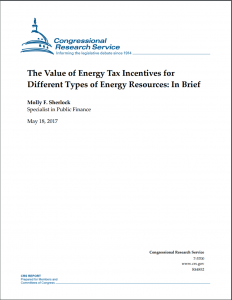Full Title: The Value of Energy Tax Incentives for Different Types of Energy Resources: In Brief
Author(s): Molly F. Sherlock
Publisher(s): Congressional Research Service
Publication Date: May 1, 2017
Full Text: Download Resource
Description (excerpt):
The U.S. tax code supports the energy sector by providing a number of targeted tax incentives, or tax incentives only available for the energy industry. As Congress evaluates the tax code and contemplates tax reform, there has been interest in understanding how energy tax benefits are distributed across different domestic energy resources. For example, what percentage of energyrelated tax benefits support fossil fuels (or support renewables)? How much domestic energy is produced using fossil fuels (or produced using renewables)? And how do these figures compare?
In 2016, the value of federal tax-related support for the energy sector was estimated to be $18.2 billion. Of this, $5.2 billion (28.6%) can be attributed to tax incentives supporting fossil fuels. Tax-related support for renewables was an estimated $11.4 billion in 2016 (or 62.6% of total tax-related support for energy). The remaining tax-related support went toward nuclear energy, efficiency measures, and alternative technology vehicles.
While the cost of tax incentives for renewables has exceeded the cost of incentives for fossil fuels in recent years, the majority of energy produced in the United States continues to be derived from fossil fuels. In 2016, fossil fuels accounted for 77.9% of U.S. primary energy production. The remaining primary energy production is attributable to renewable energy and nuclear electric resources, with shares of 12.1% and 10.0%, respectively.
The balance of energy-related tax incentives has changed over time, and it is projected to continue to change, under current law, in coming years. Factors that have contributed to recent changes in the balance of energy-related tax incentives include the following:
- Increased tax expenditures for solar and wind. Tax expenditures associated with the energy credit for solar and the production tax credit for wind have increased substantially in recent years. Following the long-term extensions of these temporary tax benefits provided in the Consolidated Appropriations Act, 2016 (P.L. 114-113), tax expenditures for the solar energy credit are projected to remain stable, while wind production tax credit tax expenditures are projected to increase, through 2020.
- The expiration of tax-related support for renewable fuels. Tax-related support for renewable fuels declined substantially after the tax credits for alcohol fuels were allowed to expire at the end of 2011. Other fuels-related incentives also expired at the end of 2016 (although these may be extended as part of the “tax extenders”).
- Expired tax incentives for energy efficiency. Several other incentives for energy efficiency have expired (again, these may be extended as part of the tax extenders). Since tax-related support for fossil fuels is expected to remain roughly constant under current law, the expiration of efficiency-related incentives means the share of tax incentives for efficiency is expected to decline.
One starting point for evaluating energy tax policy may be a calculation of subsidy relative to production level. However, a complete policy analysis might consider why the level of federal financial support differs across various energy technologies. Tax incentives for energy may support various environmental or economic objectives. For example, tax incentives designed to reduce reliance on imported petroleum may be consistent with energy security goals. Tax incentives that promote renewable energy resources may be consistent with certain environmental objectives.
